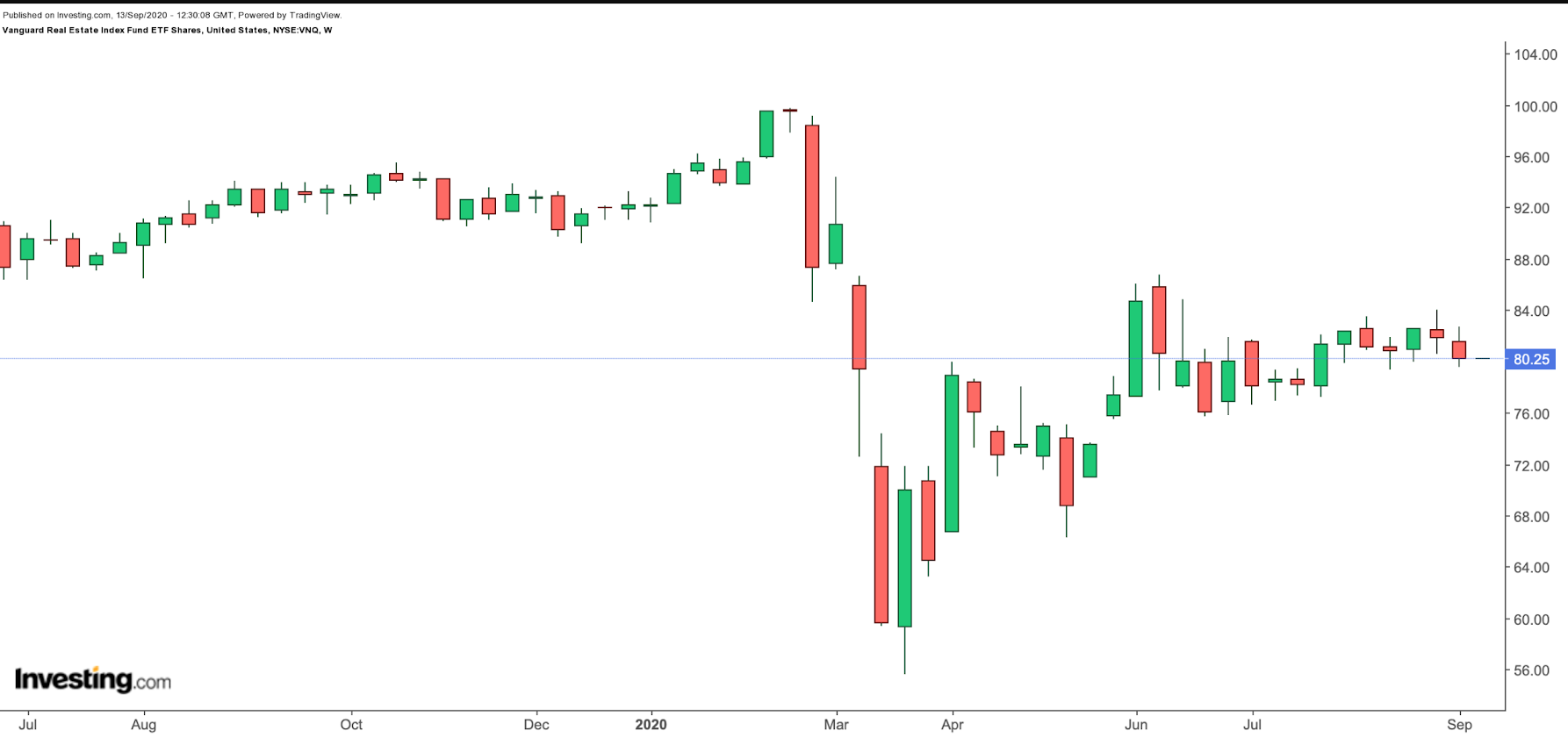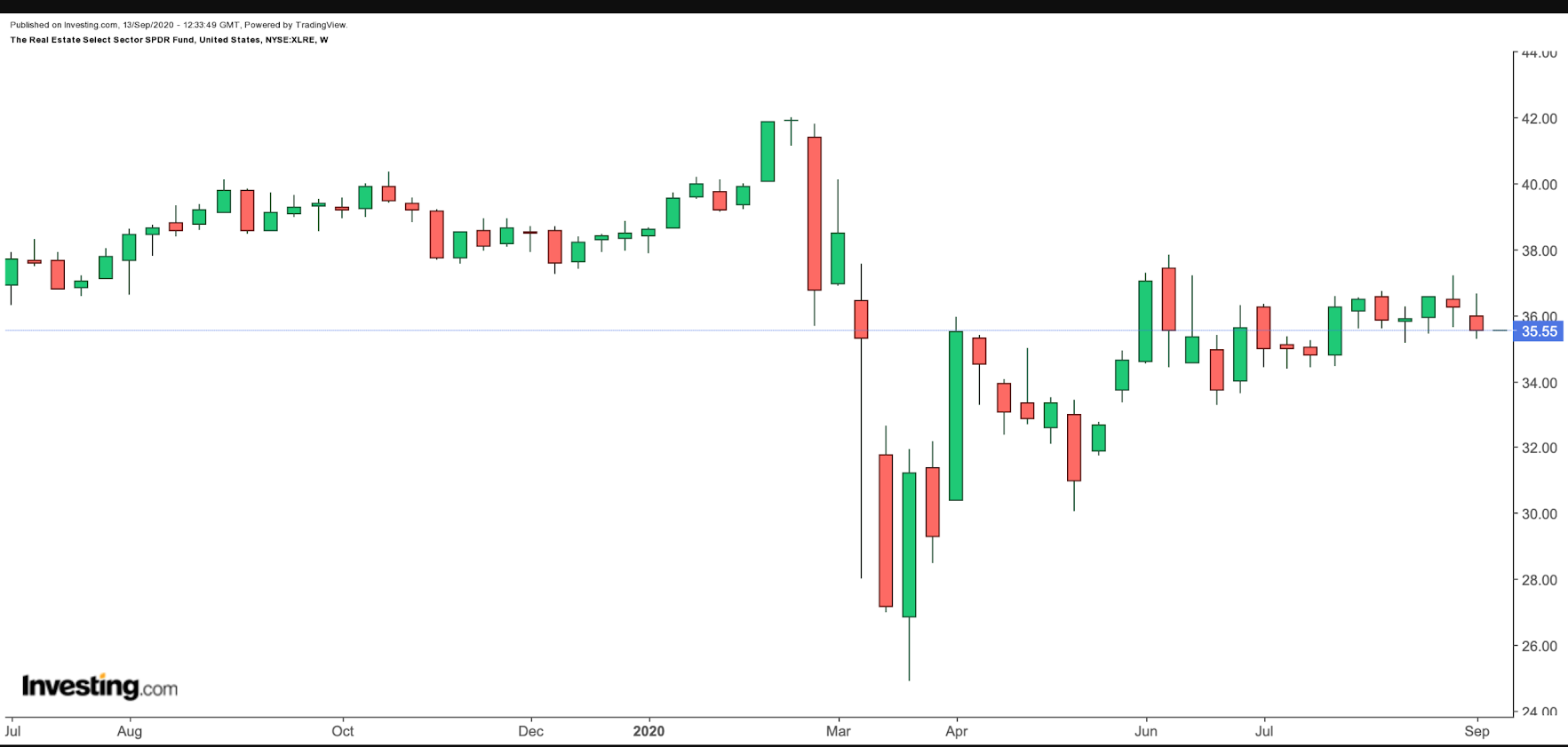The US property market has been surging again in many parts of the country following the temporary freeze in early spring brought on by coronavirus.
With interest rates at record lows in the US and other countries, investors are considering Real Estate Investment Trusts (REITs) as they tend to offer passive income from dividends and some capital appreciation. In spite of these attractive traits and the robust real estate market, many REITs have failed to keep pace with the encouraging recovery in the sector.
Here we'll break down important characteristics to keep in mind when investing in REITs and discuss two exchange-traded funds (ETFs) that should be on your radar:
What To Consider
While there can be variations in definitions of real estate investment trusts across countries, in general, REITs own, operate or finance income-generating real estate. In the US, the law requires REITs to distribute at least 90% of their taxable income annually to shareholders. As a result, their dividends tend to be stable and juicy.
Since the early days of the pandemic, retail, leisure and office rental properties especially have felt the brunt of “stay-at-home, work-from-home” trends. Therefore, as the number of COVID-19 cases increases worldwide there may be further pressure in share prices of REITs that specialize in these sub-sectors.
In the US, real estate investing typically offers consistent yet low margins. The effect of the pandemic especially on several sub-sectors in the industry has meant a margin-squeeze.
What type of REITs should long-term investors look for? We’d start researching those REITs with strong business models, portfolios and balance sheets.
Another metric to monitor: funds from operations (FFO), which is used to define cash-flow from operations. In the US, REITs calculate FFO in accordance with the standards established by the National Association of Real Estate Investment Trusts (NAREIT).
While most REITs may not be fully immune to the adverse economic effects of the pandemic going forward, the real estate industry is significantly important to most economies and investment portfolios.
Shares in these REITs can be bought and sold like other stocks throughout a trading session, but not all investors are prepared to research individual companies in the industry such as Digital Realty Trust (NYSE:DLR), Iron Mountain (NYSE:IRM), Omega Healthcare Investors (NYSE:OHI), Realty Income (NYSE:O), Simon Property Group (NYSE:SPG) and Stag Industrial (NYSESTAG).
Market participants, looking for broad exposure to real estate may instead consider ETFs.
1. Vanguard Real Estate ETF
- Current price: $80.25
- 52-week range: $55.58 – $99.72
- Dividend yield: 3.71%
- Expense ratio: 0.12% per year, or $12 on a $10,000 investment
The Vanguard Real Estate Index Fund ETF Shares (NYSE:VNQ) offers exposure to publicly traded equity real estate investment trusts (REITs).

VNQ, which has 181 holdings, follows the MSCI US REIT Index. The top three sectors of the fund include Specialized REITs (41.70%), Residential REITs (13.60%), Industrial REITs (11.80%), Healthcare REITs (8.30%) and Retail REITs (8.0%). Many of the specialized REITs come from the telecommunications and data center spaces, growing subsections of the industry.
The fund's net assets are around $3.2 billion with the ten largest holdings constituting over 49.2% of that figure. The top three names are the Vanguard Real Estate II Index Fund (NASDAQ:VRTPX), American Tower (NYSE:AMT) and Prologis (NYSE:PLD).
Year-to-date, VNQ is down about 13%. However, since its March lows, the fund is up over 40%. Therefore, short-term profit-taking is likely in the fund. Short-term technical analysis suggests that a price drop toward the $75-level or even below is possible, making the fund more attractive for long-term investors.
2. The Real Estate Select Sector SPDR Fund
- Current price: $35.55
- 52-week range: $24.88 – $42.00
- Dividend yield: 3.23%
- Gross expense ratio: 0.13% per year, or $13 on a $10,000 investment
The Real Estate Select Sector SPDR Fund (NYSE:XLRE) primarily provides exposure to REITs (97.92%) as well as real estate management and development companies (2.08%), while completely excluding Mortgage REITs.
XLRE, which has 31 holdings, tracks the Real Estate Select Sector index. The fund's net assets are around $3.2 billion with the ten largest holdings constituting over 65% of that figure. Among the top names are American Tower (NYSE:AMT), Prologis (NYSE:PLD), Crown Castle International (NYSE:CCI) and Equinix (NASDAQ:EQIX).
So far this year, the fund is down about 8%. However, like the VNQ, since early spring it is up about 40%. In the coming weeks, a fall toward 32.5 is possible. Such a decline would offer a better margin of safety for long-term investors.
Bottom Line
Passive income-seeking market participants often favor real estate investment trusts as they offer higher dividend yields than most broader indices or other sectors.
However, as REIT exchange-traded funds invest solely within the real estate industry, they may be more volatile than more broadly diversified stock funds. In fact, most REITs have seen significant declines early in the year and have not yet fully recovered all the losses. Within their risk/return profiles, long-term investors may consider allocating a portion of their holding to REITs. Green shoots may slowly be emerging in the industry.
Below are other REITs ETFs we plan to cover in the coming weeks:
